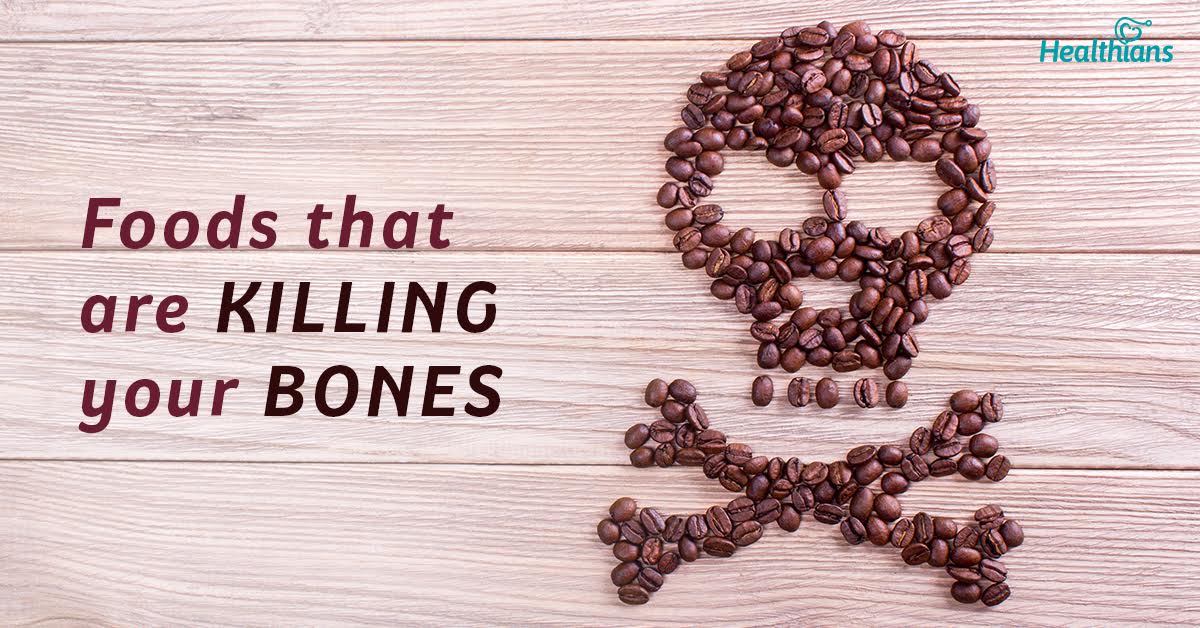Contributed by – Healthians Team
The food we eat can be either be the safest and the most powerful form of medicine, or the slowest form of poison!
Bones support us and allow us to move. They act as a shield for our brain, heart, and other organs. Bones store minerals such as calcium and phosphorous, which helps in keeping them strong and healthy, and also releases them into the body when required.
Looking at the importance of bones, it is very important to take care of them. If we don’t eat the right food and get enough of exercise our bones can go weak, causing further complications like osteoporosis, arthritis, bone fractures etc.
That food that we eat has a major impact on our bone health. Hence, keeping a watch on what we eat and identifying which foods can benefit or damage our bone density and strength is important. Though most of us are aware of the foods that benefit our bones, let’s have a look at the foods to avoid for arthritis, osteoporosis or other bone diseases. They are the silent killers that are harming our bones slowly but surely.
High sodium foods or salty snacks
A higher salt intake can cause calcium loss leading to a considerable bone loss. Hence, it is important to have a check on your salt intake.
How it effects: Salt causes excessive calcium excretion through kidneys.
Excess protein
A very high protein diet or excess of protein in diet, particularly in the form of animal protein, can take calcium away from the bones. This can lead to weakened, brittle bones, decreased bone density, a higher risk of bone injury and pain.
How it effects: High protein causes excessive urinary calcium loss.
Legumes
Mostly all Indians are found of beans and everybody soaks them in water for few hours before cooking. But how many of us actually know the reason behind it? Beans are high in substances called phytates, which slow downs the absorption of essential minerals. Soaking beans in water for a few hours before cooking help in reducing the phytate level in them. Beans are rich in magnesium, fibre, and other nutrients, making them good for osteoporosis prevention and the overall health. Legumes are considered to be foods to fight osteoporosis, so they should not be avoided but should be soaked well before cooking.
How it effects: Phytates can interfere with the body’s ability to absorb the calcium.
Inflammatory foods
Vegetables such as tomatoes, mushrooms, peppers, white potatoes, and eggplant are inflammatory foods. They can cause bone inflammation which leads to osteoporosis. These are the foods that cause arthritis.
How it effects: Causes inflammation in the bones.
Spinach and foods with Oxalates
Foods high in oxalates (oxalic acid) such as spinach, rhubarb, beet greens and certain beans excess should be avoided. These foods contain other healthy nutrients so should be taken in moderate amount.
How it effects: Oxalates interferes in calcium absorption from these foods.
Caffeine
Most of us are addicted to coffee, tea and soft drinks. All these drinks contain caffeine and they should be taken in moderation.
How it effects: Caffeine decreases calcium absorption and contribute to bone loss.
Iron rich foods
Iron is an important element in our food, but an excess amount is not good for our bones.
How it effects: Most of the foods that cause bone loss are directly a result of interfering with calcium absorption which can cause bone loss. It is advised that while eating calcium-rich foods one should avoid foods that are high in iron, in order to maximize absorption of calcium.
Alcohol
Drinking alcohol too frequently in the week or in excess amounts is bad for the bones. Limiting oneself to one or two drinks while dining out and imbibing is advisable to keep your bones safe.
How it effects: Excess alcohol can cause bone loss.
Foods rich in sugar especially artificial sweeteners are bad for the bones. They should be avoided or consumed in moderate amount.
How it effects: Sugar has a bad effect on the bones, making them more susceptible to lower bone mass, injury and osteoporosis in the future.
Soy
Soy products are dangerous for bone health. Hence, it is advised to check your portion size before consuming them.
How it effects: Soy products interfere with the calcium absorption.
Red meat
Eating too much animal protein can leach calcium from your bones, so they must be consumed in moderation. If a person is suffering from osteopenia or osteoporosis, then one should limit red meat to two times a week and keep portions small.
How it effects: Proteins leach out the calcium from the body.
Now that we have a fair idea of what not to eat for better bone health, it is also important to regularly study the health of your bones and the level of threat to them. For this, get your bone strength measured and know the calcium levels in your body, as they are the building blocks of strong bones.
Eating a little bit of everything and not a lot of anything is the key for healthy bones.




